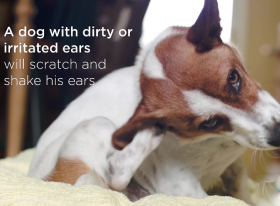
Otitis - Symptoms and Care
Characteristics of otitis in dogs
Otitis is an inflammation of the ear canal (most often external) in dogs. Painful, it can also become more complex by affecting more internal structures of the ear. Its treatment must therefore be rigorous.
Otitis is a common dermatological problem in dogs. Indeed, otitis in dogs is a dermatological problem as there is no ENT for animals.
In general, an otitis is external, and touches the external auditory canal. There are also middle and inner ear infections that affect deeper structures of the ear and that are more serious.
The starting point of otitis is the accumulation of cerumen, due to a malfunctioning of the natural self-cleaning phenomenon of the ear, which may be due to several causes (foreign body, parasite, allergy…). This accumulation leads to inflammation and in some cases to a secondary infection linked to the action of fungi or bacteria.
It is necessary to be vigilant with the chronic otitis. Without treatment, the situation may worsen and when otitis becomes chronic and is repeated 2 or 3 times per year, it becomes more complicated to manage.
Some practical tips
It not routinely indicated, regular ear cleaning is helpful if your dog is one of the breeds predisposed to ear infections. The purpose of cleaning is to eliminate what can clog the ear canal and cause inflammation. It therefore has a preventive role, but it is also useful when an otitis is installed: it is a preliminary step so that the treatment products (antibiotics, anti-fungal and / or anti-inflammatories) prescribed by your vet can then act affectively.
Cleaning is done with a suitable veterinarian product and following the advice of your vet.
Most sensitive dog breeds
There are many predisposing factors for ear infections, including ear conformation. Dogs with droopy ears such as Beagles, Cocker Spaniels and Spaniels are at higher risk, ventilation of the duct being reduced, with a risk of increased maceration. Labradors, Shar-pei, and Bulldogs are also predisposed to otitis.
Similarly, allergic dogs (atopic), which often have sensitive skin and seborrheic (oily and strong odour), are more likely to be affected by otitis.
Ear infections are very painful, and your dog may manifest it in different ways, including shaking his head, refusing to be touched because of the pain, scratching his ear…
They can be united or bilateral. The treatment combines hygienic (cleaning) and medical measures, in the form of local care.



